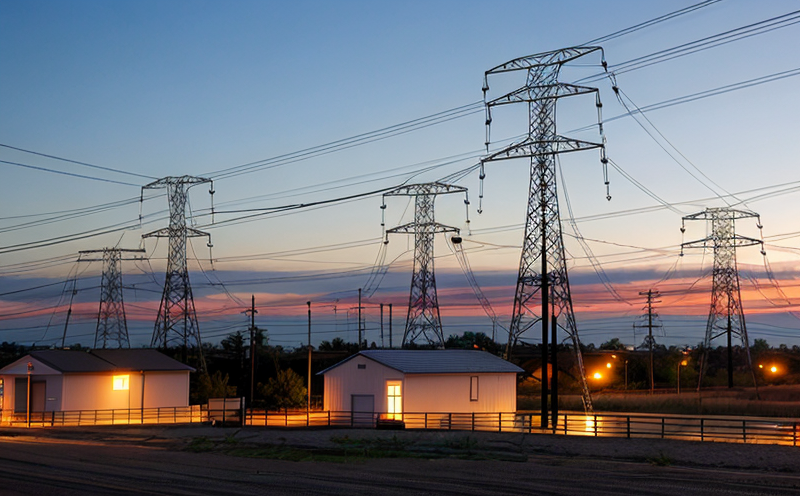EN 50530 Efficiency and Reliability Testing of Grid Inverters
The EN 50530 standard is pivotal for ensuring the reliability, efficiency, and safety of grid inverters used in power distribution systems. This standard applies to all types of inverters that convert direct current (DC) into alternating current (AC), making it a critical component in the seamless integration of renewable energy sources like solar photovoltaic (PV) systems into the electrical grid.
Grid inverters are responsible for converting the DC power generated by solar panels or other renewable energy sources into AC, which is compatible with the existing electricity distribution network. The EN 50530 standard specifies performance criteria and test methods to ensure that these devices meet stringent reliability and efficiency standards. This ensures that grid inverters operate safely and effectively over their entire operational life cycle.
The testing process under EN 50530 involves a series of rigorous procedures aimed at assessing the inverter's ability to handle various operating conditions, including voltage fluctuations, temperature variations, and fault scenarios. By adhering to this standard, manufacturers can guarantee that their inverters will perform optimally across a wide range of environmental and operational conditions.
One key aspect of EN 50530 is the focus on efficiency testing. This involves measuring how much electrical power an inverter can convert from DC input to AC output. The standard sets specific thresholds for minimum efficiency levels, which are critical for reducing energy losses and optimizing performance. Another crucial component of the test is reliability analysis, ensuring that inverters can maintain consistent performance over extended periods without degradation or failure.
The testing process typically includes a series of simulations designed to mimic real-world conditions. For example, an inverter may be subjected to high ambient temperatures, rapid voltage changes, and varying loads. These tests help identify potential weaknesses in the design that could lead to operational issues under actual field conditions. By subjecting inverters to these stressors during testing, manufacturers can ensure a higher degree of reliability and longevity.
Another important aspect of EN 50530 is its emphasis on safety features. The standard requires that grid inverters have robust protection mechanisms in place to prevent damage or hazards under fault conditions. This includes provisions for overcurrent, overvoltage, and short-circuit protections. Ensuring these critical safety features are tested and certified according to EN 50530 is essential for minimizing risks associated with the operation of renewable energy systems.
In summary, the EN 50530 standard plays a vital role in safeguarding the integrity and performance of grid inverters. By adhering to this stringent testing protocol, manufacturers can produce high-quality products that meet global standards for reliability, efficiency, and safety. This is particularly important given the growing demand for renewable energy sources and the increasing complexity of modern electrical grids.
Customer Impact and Satisfaction
- Better Performance: Customers benefit from more efficient grid inverters, which translate to reduced energy losses and improved overall system performance.
- Enhanced Reliability: Inverters that meet EN 50530 standards are less likely to fail or degrade over time, leading to fewer disruptions in power supply.
- Safety Assurance: With robust protection mechanisms as part of the testing protocol, customers can operate their renewable energy systems with peace of mind, knowing they comply with international safety norms.
- Compliance and Reputation: Compliance with EN 50530 enhances a company's reputation for quality and reliability, which is crucial in competitive markets.
The implementation of this standard has been particularly impactful for businesses involved in the renewable energy sector. By ensuring that grid inverters meet the required standards, companies can demonstrate their commitment to sustainability and efficiency. This not only improves customer satisfaction but also fosters trust within the industry.
International Acceptance and Recognition
The EN 50530 standard is widely recognized across Europe and has gained international acceptance due to its comprehensive approach to testing grid inverters. It is harmonized with other global standards, such as the IEC 61851 series, ensuring consistency in quality and performance metrics.
The European Committee for Standardization (CEN) oversees the development and maintenance of this standard, making it a trusted reference point for manufacturers and regulatory bodies across Europe. Its widespread adoption reflects its importance in promoting interoperability between different renewable energy systems within the grid.
Compliance with EN 50530 is not only essential for meeting local regulations but also enhances market access to other countries that recognize these standards. This global recognition ensures that manufacturers can confidently export their products, knowing they meet stringent international requirements.
Use Cases and Application Examples
| Use Case | Description |
|---|---|
| Solar PV System Integration | Inverters tested under EN 50530 are used to connect solar PV systems to the grid, ensuring safe and efficient power generation. |
| Energy Storage Systems (ESS) | EN 50530 ensures that inverters for energy storage systems function reliably, even in challenging environmental conditions. |
| Rooftop Solar Installations | The standard helps guarantee the performance of inverters used in small-scale rooftop solar installations, which are becoming increasingly popular. |
| Utility-Scale Renewable Projects | EN 50530 is crucial for large-scale renewable energy projects that require high-efficiency and reliable grid integration solutions. |
| Microgrids | Inverters tested according to EN 50530 are used in microgrid applications, ensuring seamless operation during both grid connection and islanded mode. |
The diverse range of applications underscores the versatility and importance of this standard. Whether for small-scale residential installations or large utility projects, the EN 50530 standard ensures that inverters perform consistently under various operational conditions.





